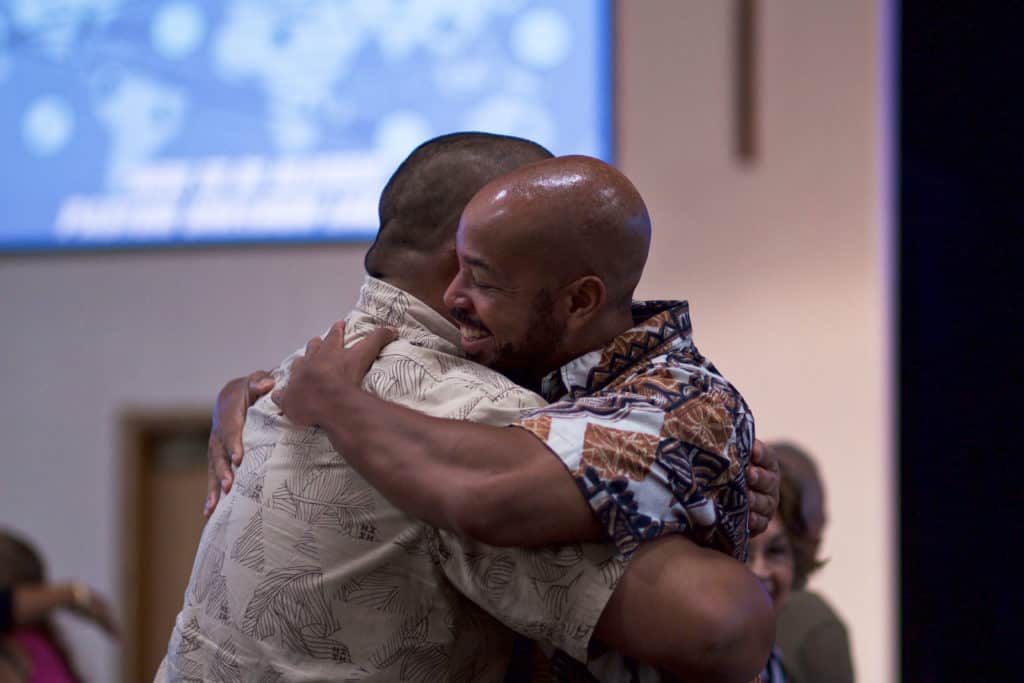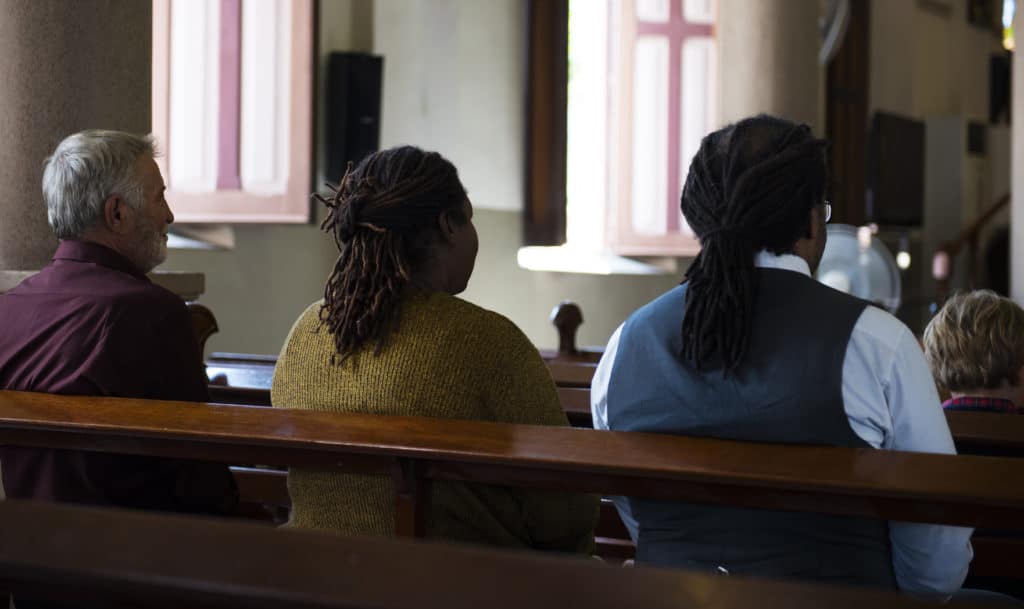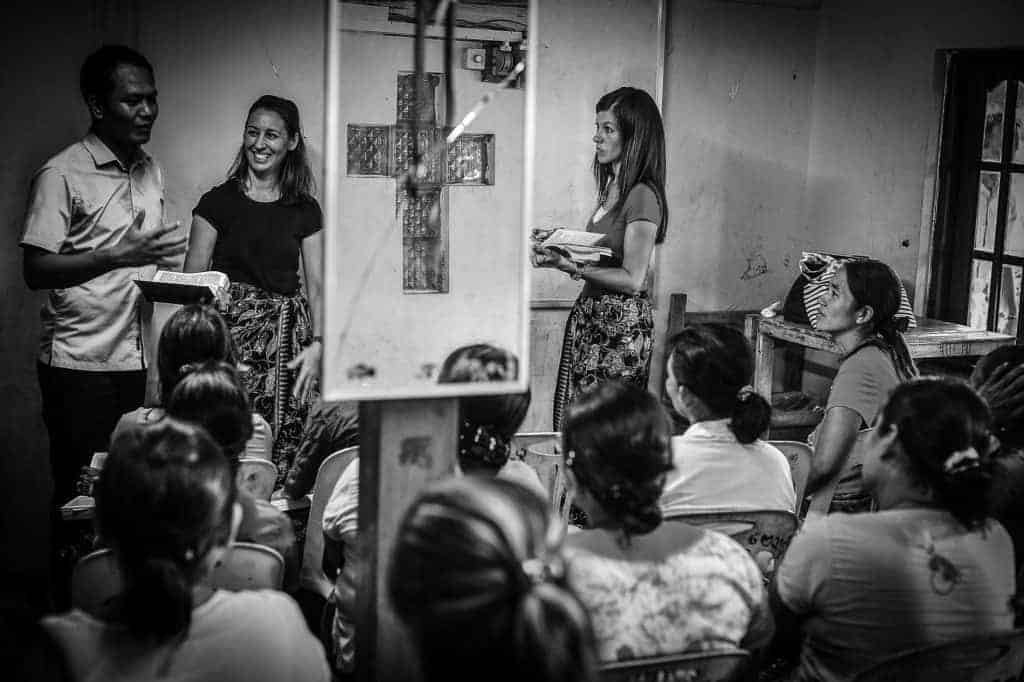What does unity look like among many different groups of diverse people?
The Seventh-day Adventist Church is a worldwide denomination, spanning multiple cultures, languages, etc. However, while fully appreciating the uniqueness God created us with, Adventists also work together toward the same goal—sharing the gospel of Jesus to the far corners of the earth.
Just like Jesus and His disciples worked toward in the Bible, Adventists seek to maintain a supportive unity of mission. So let’s take a closer look at:
- How Jesus promoted unity among His followers
- What unity truly means
- Unity through the model of the Body of Christ
- Why is such unity necessary?
- Following Christ’s example of unity today
Belief 14: Unity in the Body of Christ
The church is one body with many members, called from every nation, kindred, tongue, and people. In Christ we are a new creation; distinctions of race, culture, learning, and nationality, and differences between high and low, rich and poor, male and female, must not be divisive among us. We are all equal in Christ, who by one Spirit has bonded us into one fellowship with Him and with one another; we are to serve and be served without partiality or reservation. Through the revelation of Jesus Christ in the Scriptures we share the same faith and hope, and reach out in one witness to all. This unity has its source in the oneness of the triune God, who has adopted us as His children. (Ps. 133:1; Matt. 28:19, 20; John 17:20-23; Acts 17:26, 27; Rom. 12:4, 5; 1 Cor. 12:12-14; 2 Cor. 5:16, 17; Gal. 3:27-29; Eph. 2:13-16; 4:3-6, 11-16; Col. 3:10-15.)

How Jesus Christ encouraged unity among believers
Jesus was never one to be confined by social convention. Whether it was making friends with tax-collectors, healing lepers others were afraid to touch, or holding a conversation with the Samaritan woman at the well, Jesus made it clear his Gospel was for everyone, not just Jews.
He made a point of reaching out to people who were categorically different from Him, sharing the good news of his Father’s love. And, right before he went back to heaven, he instructed his disciples to do the same.
“Thus it is written, that the Christ should suffer and on the third day rise from the dead, and that repentance for the forgiveness of sins should be proclaimed in his name to all nations, beginning from Jerusalem” (Luke 24:46-47, ESV, emphasis added).
Every single human being was intentionally created by God, willed by Him into existence! And Christ’s ministry tells us there’s room enough in God’s kingdom for everyone, regardless of nation, race, color, or culture.
“Have we not all one Father? Has not one God created us?” (Malachi 2:10, NKJV).
A person’s gender, financial status, or level of education should make no difference in the value of a person, or the ability to work together with them. Jesus wants the good news of salvation to be spread across the entire world so everyone will have the opportunity to join God’s family and be a part of the Church, the Body of Christ.
This is wonderful news! It means no one is going to be excluded or left out. It also means God’s family will be diverse.
Think about it. If everyone on Earth will one day have a chance to hear the gospel, imagine how many different types of people there’ll be in Heaven. Countless people from different countries, cultures, and even different times, speaking different languages and having different opinions, personalities, and worldviews.
But one thought is hard to ignore: How could such a disjointed family possibly work together and get anything done?
Only through the power of the love of God.
When we accept God’s grace and choose to live by His ways, we are brought into His family, the body of Christ. And God commands the Body of Christ to be unified (Romans 12:4, 5, 16; Ephesians 4:3).
So, what does unity look like? How do we become unified with other believers and why is it so important? God answers all those questions for us through his word.
Want a deeper understanding of God’s word? Check out our Bible Studies to learn what the Bible says about different topics.

The true meaning of unity
Christian unity means having a singular goal in mind and serving others rather than ourselves. But being unified doesn’t mean shutting off our individual personalities and becoming a blank slate for other people’s ideas.
When we accept Christ’s forgiveness and choose to live for him, we become a part of his worldwide family. And Jesus doesn’t want his family to have disunity or be divided by petty squabbles and clashes of ego. In fact, Jesus specifically prayed to God for his followers to be unified right before he went back to Heaven.
“And I am no longer in the world, but they are in the world, and I am coming to you. Holy Father, keep them in your name, which you have given me, that they may be one, even as we are one” (John 17:11, ESV).
Jesus used his bond with his Heavenly Father as an example for what he wanted the church body to be like. Jesus and the Father were never at odds. They shared a strong bond, holding the same goals and knowing each other’s hearts, working as one. That’s the kind of unity Jesus asked God to give to his followers. We are called to be unified, working together in Christ’s name.
For some people, this sounds wonderful, like being part of a huge, loving family that never argues or disagrees. Others find the idea of unity stifling, feeling that conforming to some sort of group norm makes them less themselves.

But unity doesn’t mean uniformity. On the contrary, God recognizes and appreciates the skills and personalities each of us have that make us unique.
He created us after all. We are, as the psalmist said, “fearfully and wonderfully made” (Psalm 139:14). God designed us to be diverse, to have different strengths, skills, viewpoints, and opinions. But He wants us to use and appreciate those differences instead of using them as the basis for arguments and self-pride.
Every person in the world is equally loved in God’s eyes. Every person is valued and useful, albeit in different ways (Romans 12:4-8). Rather than turning unity into uniformity and trying to fit everyone into the same mold, God asks us to embrace the differences He created us with and work together.
We can do this by figuring out how other people think, incorporating empathy into our interactions, and doing our best to understand others, putting our own ambitions aside. Regardless of our different backgrounds, cultures, or opinions, there are two things we all have in common:
- Our shared heritage from Adam and Eve.
- Our redemption in Christ.
Once we come to grips with these two unifying factors, we can learn to look past first impressions and see people the way God wants us to see them, as brothers and sisters in His family. That is how the church body becomes united in Christ.

The Body of Christ
Christ calls us to be unified. This concept of church unity is sometimes referred to as being a part of the Body of Christ. Christ wants His people to be so in-tune with each other and with Him that they cooperate as if they were one body.
But what does unity look like? How can people be united while still embracing their identity as individuals created by God. How can a group of such different people be united and yet distinct?
The apostle Paul actually addresses this in one of his letters to the church in Corinth. He starts out by explaining to them that God blesses different people with different sorts of gifts, all of which are to be used to honor him. One person might be skilled in healing, while another might possess great wisdom or knowledge or a gift for languages. But each of them have worth and value in God’s church.
“All these are empowered by one and the same Spirit, who apportions to each one individually as he wills.
For just as the body is one and has many members, and all the members of the body, though many, are one body, so it is with Christ. For in one Spirit we were all baptized into one body—Jews or Greeks, slaves or free—and all were made to drink of one Spirit.
For the body does not consist of one member but of many. If the foot should say, “Because I am not a hand, I do not belong to the body,” that would not make it any less a part of the body. And if the ear should say, “Because I am not an eye, I do not belong to the body,” that would not make it any less a part of the body. If the whole body were an eye, where would be the sense of hearing? If the whole body were an ear, where would be the sense of smell? But as it is, God arranged the members in the body, each one of them, as he chose. If all were a single member, where would the body be? As it is, there are many parts, yet one body.
The eye cannot say to the hand, “I have no need of you,” nor again the head to the feet, “I have no need of you”… But God has so composed the body, giving greater honor to the part that lacked it, that there may be no division in the body, but that the members may have the same care for one another. If one member suffers, all suffer together; if one member is honored, all rejoice together” (1 Corinthians 12:11-26 ESV).

This is what the body of Christ looks like. Hundreds of different organs performing different tasks all for the good of the body.
When we are part of God’s family, we shouldn’t look at ourselves and think that just because we don’t have the skills someone else has, we don’t belong in the church. Nor can we be so caught up with ourselves we believe we don’t need other people and can get to Heaven all on our own.
God designed us to need each other. It’s our calling as Christians to lift each other up, rather than trying to isolate ourselves. Just like Paul’s illustration of the body, the only way the church can be unified is if we recognize we are all different, we all need each other, and God’s grace is the bond that holds us together.

Why is unity so necessary?
In the same way a body cannot function properly if the feet do not step together, the hands are not coordinated, or the organs fail, Christ’s people cannot function if they are unable to cooperate. If each of us believed that we knew best and split off to do our own thing, we’d never fulfill the mission our Lord gave us to spread His love and reveal His character to the world at large.
But unity isn’t just meant to make Christ’s body more cooperative and efficient. It’s also meant to make us more compassionate, able to feel the pain others go through and build them up, rather than becoming prejudiced and spending all our time trying to build ourselves up.
During Christ’s time on earth, he had difficulty dealing with the disciples who followed him. They were constantly bickering, arguing about who would be most important once Jesus was crowned king.
They never understood the true point of what Jesus was trying to do until after his crucifixion. But once they put their focus on Christ instead of themselves, they became great apostles, spreading Jesus’ story wherever they went.
Reading the book of Acts shows us incredible examples of what God’s people can do when they let go of their pride and follow Jesus’ command for unity.

Following Christ’s Example
Through scriptures, Jesus made it clear how important it is for his family to be unified in God, rather than wasting their time bickering about who’s most important or who’s different.
During His time on Earth, Jesus’ disciples missed out on all the important lessons He was trying to teach them because they were too busy arguing about who would be ‘the greatest’ in the kingdom of heaven (Matthew 18:1-6, Mark 10:33-37, Luke 22:24-30).
God doesn’t want us to miss out on lessons and blessings because of our own pride. We are called to be like a body, many separate parts working towards a common purpose, cooperating and bearing each other’s sorrows. This gives the body of Christ purpose and direction, strengthening the body through fellowship and compassion.
Being united in mission is the only way for God’s family to truly grow.
But perhaps the most important reason of all for God’s people to strive for unity is that, when we let go of our pride, put others first, and try to cooperate, we are living out the example Jesus set for us.
Jesus, even while he was one earth, was in perfect unity with the Father and the Holy Spirit. This Trinity is the perfect example of what unity should be, an example Jesus asks all of his people to follow.
“The glory that you have given me I have given to them, that they may be one even as we are one, I in them and you in me, that they may become perfectly one, so that the world may know that you sent me and loved them even as you loved me” (John 17:22-23, ESV).
If we want to live by the example Christ set for us, then we need to learn how to be unified, seeing people the way Jesus sees them and putting others before ourselves.
This may be difficult. It is in our human nature to want our own way, but if we ask Him, God promises He will give us the strength to put others first and live as a part of His family.
To experience the kind of unity that celebrates God-given uniqueness while also maintaining a feeling of usefulness, belonging and purpose—this can be one of the greatest joys of being alive. It can fulfill our innermost desires as humans, especially when what unites us is our Creator.
No matter who you are, there is a place for you in the Body of Christ!
No matter who you are, there is a place for you in the Body of Christ!



God’s Anointing for Unity
“Behold, how good and how pleasant it is for brethren to dwell together in unity! It is like the pre…
Read More
Preserving Church Unity: Lessons from the Jerusalem Church
The whole group of those who believed were of one heart and soul” (Acts 4:32, NRSV). Thus, Luke desc…
Read More